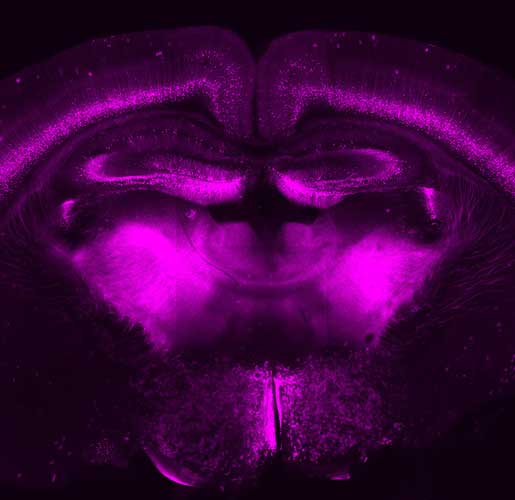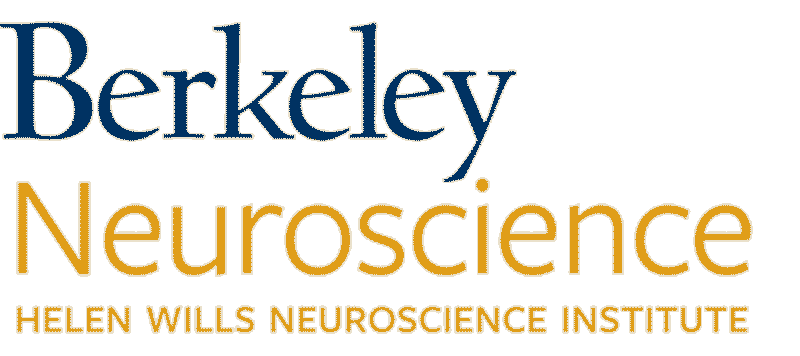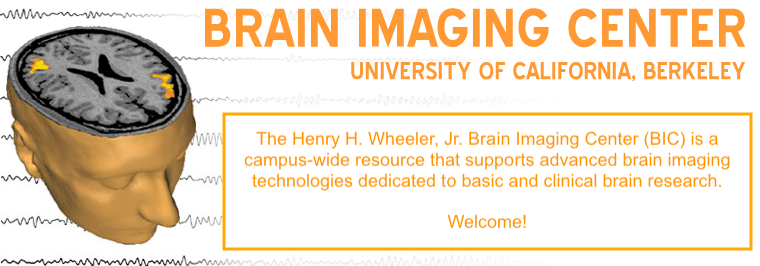UC Berkeley photo by Malachi Tran

Our community is the nexus for campus-wide multidisciplinary neuroscience research at UC Berkeley.
Our broad research focus is the study of the nervous system, from single molecules to human behavior, with an emphasis on interdisciplinary approaches and use-inspired research. Our research mission is to deepen our understanding of how the brain and the rest of the nervous system functions, develops, changes, and ages, and the processes involved in neurological diseases and disorders. We are building next-generation experimental, analytical, and theoretical approaches to probe neuronal function and to elucidate the mechanisms underlying sensation, perception, behavior, learning, and cognition, and develop new ways to diagnose and treat diseases and disorders. Visit our faculty page to explore the research interests of our faculty.
We also support our faculty by sponsoring research initiatives and leading-edge research and technology centers.
Advances in understanding brain function and brain disorders are often enabled by cutting-edge technology and the focus of the brightest scientific minds from diverse disciplines around a common goal. HWNI fosters advances in neuroscience by sponsoring major research initiatives and research and technology centers. Our research initiatives, such as the Radical Ideas in Brain Science Challenge and the Rennie Fund for the Study of Epilepsy, provide funding for cutting-edge research and encourage interdisciplinary and collaborative approaches.
Our research and technology centers bring together interdisciplinary groups of researchers to support new areas of research, develop tools for neuroscience research, and apply the new knowledge and tools to advance our understanding of the brain. Our centers are The Center for Neural Engineering and Prostheses (CNEP), The Henry H. Wheeler, Jr. Brain Imaging Center (BIC), The Institute for Cognitive and Brain Sciences (ICBS), The Redwood Center for Theoretical Neuroscience (RCTN), and The Berkeley Center for the Science of Psychedelics (BCSP) and the Weill Neurohub.
Rennie Fund for the Study of Epilepsy
Application period for 2023 is now closed. Check back here January 2024.
The Rennie Fund provides 1-year awards to support new research on epilepsy. Proposals can be directly related to epilepsy, or to closely related areas in neuroscience (the epilepsy connection is a plus but not required). The funding amount is in the range of $20-40K, for 1 year of support, for a single research group or a team. Funds can be used to support research, development, conferences, and postdoc/graduate student support. Faculty salary should be no more than 10% of total expenditures.
Proposals consist of a 1-page research description, a lay summary, a 1-page budget justification, and CV(s) or biosketch(es) for PI(s).
History of Program and Donor
The Rennie Fund was created in 1962 as the result of a bequest from the Mary Elizabeth Rennie Trust. Ms. Rennie’s brother, William Rennie, Jr., had been a member of the Berkeley class of 1919. The bequest was initially made to the UC Regents to be used at their discretion for the study of epilepsy, but in 1981, the fund was allocated to the UC Berkeley campus.
From 1981 to 2017, the Berkeley Division of the Academic Senate funded 2-3 grants per year to faculty doing research on epilepsy as part of the Senate’s faculty grants program. Many of those faculty are now affiliated with the Helen Wills Neuroscience Institute (HWNI). In 2017, the Senate transferred the Rennie Fund to HWNI, which currently administers the fund.
Award Amount
Awards will be $20-40K per funded proposal. The award will be provided in a single installment on September 1, available for a period of one year. We anticipate making up to 1-2 awards per year.
Proposal Requirements
At least one participant should be a UC Berkeley ladder-rank faculty member whose area of research includes epilepsy or an epilepsy-related area.
2023 Application Process: Rennie Fund for the Study of Epilepsy
At least one PI should be a UC Berkeley ladder-rank faculty member whose area of research includes epilepsy or an epilepsy-related area.
Proposals should describe how the support will enable new knowledge development and/or target major gaps in our current knowledge of epilepsy. Eligible activities for the Rennie Fund include, but are not limited to: research and development, conferences, and postdoc/graduate student support. Faculty salaries should be no more than 10% of total expenditures.
Applications should be submitted electronically as a single PDF file that includes:
Title page with proposal title, PI (and co-PIs, if relevant), and their department affiliations
1-paragraph lay summary of project
1 page project description
1-page budget and justification
CVs or biosketch(es) for PI (and co-PIs)
The lay summary should be accessible to non-scientists and speak to the goals as well as the potential societal impact of the project. Send applications to neuroscience@berkeley.edu by April 28, 2023 at 5pm. Please direct questions to neuroscience@berkeley.edu. Proposals should not be routed through SPO. Please name the PDF as follows: lead PI “Last name_first name_RennieFund_2023.pdf”. Include a running header on the top right-hand corner of the PDF with the lead PI’s last name, first name, proposal title, and year.
The selection committee is composed of the director of HWNI and a panel of faculty selected from the HWNI membership. The selection committee members are asked to rate the proposals based on a rubric created by HWNI. The committee members recommendations are forwarded to the director of HWNI for ultimate determination.
At the completion of the project, a 1-2 page progress report will be required.
Timeline
-
March 6, 2023 – Program announcement
-
April 28 , 2023 – Applications due by 5pm
-
June 16, 2023 – Selection notifications to applicants
-
September 1, 2023 – Project start date
-
September 1, 2024 – Progress report to selection committee
Recent Recipients
Dan Feldman – Homeostatic regulation of cortical excitability by PV interneurons
Daniela Kaufer – Prevention of acquired epilepsies in pediatric trauma
Real breakthroughs in neuroscience will only happen with a united effort across vast disciplinary terrain in biology, chemistry, physics, psychology and engineering. The greatest leaps will happen when science and technology can be combined across disciplines.
Berkeley provides a phenomenal breadth and depth of renowned faculty and inventive students who can create such leaps. The Radical Ideas in Brain Science Challenge is designed to kick-start new multi-disciplinary collaborations that create breakthroughs in understanding the brain and mind in health and disease.
The Radical Ideas program funds high-risk / high-potential proposals at an early stage to enable them to transition new approaches to problems in brain science from the concept stage to the point of proof of concept. The expectation is that, if successful during their 2-years of support, such research projects will demonstrate feasibility, and make it possible to obtain continuing support from established funding mechanisms of federal and foundation grants.
2020 Program Overview:
Award Amount: One team will be selected for an award of $237,000. The award will be provided in annual installments of $118,500, with the second installment pending an annual progress review.
2020 Application Process: Radical Ideas in Brain Science Challenge
Given the interest in fostering new cross-disciplinary approaches, we require the following team composition:
At least one participant should be a faculty member of the Helen Wills Neuroscience Institute (HWNI).
At least one additional participant should be a UC Berkeley ladder-rank faculty member who is from a discipline different from that of the HWNI member. This could include additional HWNI members. Teams that include faculty from social sciences and humanities are encouraged to apply.
External participants from industry, national labs, or peer universities are encouraged, but not mandatory.
Proposals will describe how the support will enable new cross-disciplinary research relationships and areas of new knowledge development, target major gaps in our current knowledge, and describe how the support will enable a clear path from research concept to formal research and development. Faculty salaries should be no more than 10% of total expenditures.
Applications are to be submitted electronically as a single PDF file that includes:
Title page with proposal title, PI and co-PIs, and their department affiliations
1-paragraph lay summary of project
3-5 page project description
1-page budget and justification
CVs or biosketches of the PI and co-PIs
The lay summary should be accessible to non-scientists and speak to the goals as well as the potential societal impact of the project. Send applications and/or questions to neuroscience@berkeley.edu. Proposals should not be routed through SPO. Please name the PDF as follows: lead PI “Last name_first name_RadicalIdeas_20XX.pdf”. Include a running header on the top right-hand corner of the PDF with the lead PI’s last name, first name, proposal title, and year.
The selection committee is composed of the director of HWNI and a panel of faculty selected from the HWNI membership. The selection committee members are asked to rate the proposals based on a rubric created by HWNI. The committee members recommendations are forwarded to the director of HWNI for ultimate determination.
One team will be selected for an award of $237,000. The award will be provided in annual installments of $118,500. The second installment of the award funds will depend on the completion of an annual progress report. A final presentation will be made to the broader neuroscience community at UC Berkeley, with the sponsoring donor invited to participate. Publications arising from award shall acknowledge support from the Institute and the donor.
- August 18, 2020 – Program Announcement
- September 25, 2020 – Applications due by 5pm
- October 23, 2020 – Selection notifications to applicants
- January 4, 2021 – Project start date
- January, 2023 – Final presentation
Recent Recipients
2020: Non-invasive targeting of impaired temporal homeostasis as a novel therapeutic for age-related cognitive decline
— Yang Dan
2018: Blood-brain barrier dysfunction as a novel mechanism of age-related cognitive decline and Alzheimer’s disease
2017: Tools to Illuminate a Missing Dimension in Neuroimaging: Neuromodulation
History of Program and Donor
The Alper Fellowship in the Neurosciences was created in 2022 to recognize the 55th anniversary of Mark Alper joining the Department of Molecular and Cell Biology (MCB; known then as the Department of Biochemistry) and his teaching in MCB until his retirement. Through this fellowship, Mark and Christine Alper wish to support graduate students within the Neuroscience and MCB PhD Programs whose proposed research project involves basic research related to the causes and/or treatment of mental health conditions including major depression, anxiety, or closely related illnesses. The Alper Fellow will receive a stipend of $48,000/ year at the start of the fall semester of the third year of the Fellow’s PhD program and this may be renewed for up to 3 years.
Proposal Requirements
Interested students shall submit a two-page Proposal describing the proposed research, which will include a project summary, description of how that research, while fundamental, is likely to have an important impact on our understanding and/or treatment of mental health conditions listed above.
Applications should include the applicant’s CV. In addition, the student’s thesis mentor shall provide a letter of nomination of the student including a commitment to cover the cost of fees, benefits and overhead, if any.
Please include the Proposal, CV, and Letter of Nomination documents as a single PDF file on your application.
Send applications to neuroscience@berkeley.edu. Proposals should not be routed through SPO. Please submit as a single PDF and name the PDF as follows: Student “Last name_first name_Alper Fund_4 digit year.pdf”. Include a running header on the top right-hand corner of the PDF with the student’s last name, first name, PI, proposal title, and year. Please direct questions to neuroscience@berkeley.edu.
The following criteria should be met by the selected fellow:
-The fellow is enrolled in a program leading to the PhD degree in MCB or Neuroscience at UC Berkeley
-The fellow is entering the third year of graduate study in good standing at the start of the award year. Including completion of program milestones such as passing the qualifying exam, advancing to candidacy and submission of annual progress reports
-The fellow’s proposed research project directly involves basic studies exploring the underlying molecular and cellular mechanisms and the eventual treatment of mental health conditions such as major depression, anxiety, or closely related illnesses.
-The fellow, after a review of the design of the proposed project (concept quality and focus area alignment) and the quality of work in their PhD program during the first two years of residency, is deemed to be the most likely of those meeting criteria above to make a significant contribution to the fields outlined above.
Selection Committee and Process
The selection committee is composed of the director of HWNI and a panel of faculty selected from the HWNI membership. Faculty with students applying will not be involved in the selection process. The selection committee members are asked to rate the proposals based on a rubric created by HWNI which includes concept quality and focus area alignment. The committee members rate the proposals and then make a final recommendation to the director of HWNI for ultimate determination.
Reporting Requirements
The fellow shall submit to the HWNI director a progress report within a month after the end of the spring semester of the award. Explicit reference shall be made in the report to the impact the research had or is likely to have on the understanding and/or treatment of mental health conditions mentioned above. A copy of publications reporting this work will be included and should credit funding as “A.B. was supported by an Alper Fellowship in the Neurosciences”.
Timeline
January 20, 2023- Call for proposals
March 3, 2023- Applications due by 5pm
May 26, 2023- Selection/ non-selection notification
July 1, 2023- Fellowship start date
Are you a patient or family member seeking research information or opportunities? Some of our research projects may be accepting participants.








